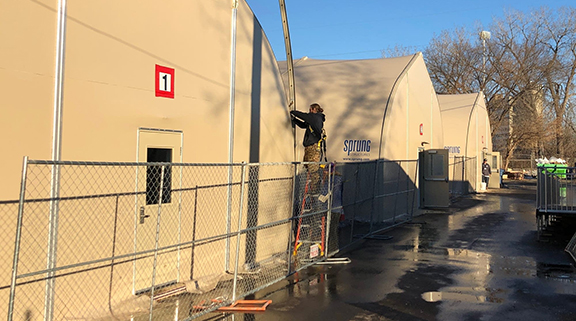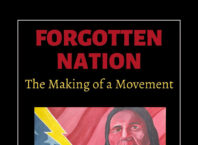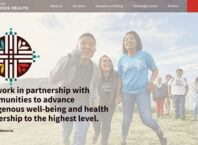
By Lee Egerstrom
The Bush Foundation has awarded the Native American Community Development Institute (NACDI) a two-year, $207,000 grant to explore community-based solutions to the chronic homelessness problems for Native Americans in Minneapolis.
Minneapolis-based NACDI is leading the effort but is working in tandem with the Metropolitan Urban Indian Directors (MUID) umbrella organization for Native groups. It also has enlisted outside consultants on the project, the Lakewood, Colo.-based Indigenous Collaboration Inc.
This came about late in the past year when Native groups in Minneapolis, working with the city and with various state and local agencies and nonprofits, struggled with finding emergency shelter and services for the Minneapolis homeless encampment in the Franklin and Hiawatha Avenues area of south Minneapolis.
That encampment was known as The Wall of Forgotten Natives. But the 300 to 400 mostly Native people who were living in tents and sleeping bags are not being forgotten, said Robert Lilligren, president and chief executive of NACDI who this year also serves as chair of MUID.
The outdoor encampment was closed in December and 140 people from the camp were moved indoors in tents at what is called the Navigation Center. It is in property owned by the Red Lake Nation that is scheduled for development as affordable housing, beginning next year.
“Bush was watching what we were doing,” Lilligren said. “It was a strange moment in philanthropy for us. They came to us and two weeks later we had a grant.”
The grant is from the St. Paul-based Bush Foundation’s Community Innovation Program that assists community efforts to find problem solving solutions for the betterment of the entire region. The Bush Foundation was created by a 3M Company executive, Archibald Bush, and his wife Edith. Their philanthropic works have provided more than $1 billion to organizations and individuals in the Upper Midwest.
“At the Bush Foundation, we believe NACDI’s ability to collaborate and engage the community can result in shared ownership of solutions to conditions causing homelessness in the Native community, said Rudy Guglielmo, manager of the Community Innovation program for the foundation.
The mechanism for NACDI’s project is newly-formed WiiDooKoDaaDiiWag, or “They Help Each Other” in Ojibwe, that is shortened for convenience to THEO.
Initial work is reaching out to people who are among the homeless. “We want to hear the thoughts from the people most impacted,” Lilligren said.
That is a far greater number than the people who were living in the encampment.
By various measures, Native Americans are over represented in homelessness.
Sometimes lumped together with other population groups as “people of color,” and sometimes alone, statistical analysis shows Native Americans are from eight times, to 17 times, and as much as 27 times more likely than other Minnesotans – either in the state or in Minneapolis – to be counted among the homeless.
Regardless of measures used, there is no disagreement that the Native population is over represented. That’s where “out of sight, out of mind” problems often hurt the Native population, said Lilligren.
“Spring is coming,” he said. “What happens when the Navigation Center closes?”
MUID organizations and leaders came together last fall to address immediate needs for shelter and services, especially with winter approaching. They continue to look at what services will be needed when spring arrives and the Navigation Center is closed.
Longer term, however, THEO and its partners and allies are looking for ways to tackle the historic and ongoing problems of homelessness for the Native community, Lilligren said.
Bush’s Guglielmo said NACDI’s history and “depth of relationships” makes it ideal for lead the effort.
The grant was for $200,000 and an additional $7,000 was provided for special “engagement” needs, he said.
Lilligren said NACDI did a nationwide search for guidance when the grant came through. That brought Indigenous Collaborations into the picture as a partner.
The leadership team for WiiDooKoDaaDiiWag/ THEO includes Lilligren (White Earth Ojibwe), consultant Carrie Day Aspinwall (Leech Lake Ojibwe), and from Indigenous Collaborations, Lesley Kabotie (Crow Tribe of Montana) and Paul Kabotie (Hopi Tribe of Arizona and Santa Clara Pueblo from New Mexico). The Kaboties are president and vice president of Indigenous Collaboration.
While still in early stages of the project, the THEO partners have had two gatherings with impacted people to begin the process, Lilligren said. One was a feast at the Minneapolis American Indian Center, with a spiritual leader, that Lilligren described as a “healing session.”
NACDI, MUID and allied groups describe the project ahead as a search for community-based solutions and strategies aimed at underlying issues for Native homelessness.
“We know that these strategies must be both innovative and community-based if they are to successfully address the historic, systemic challenges facing the Native community,” they said in an initial announcement.
- Backgrounds on partners in the project include:
– NACDI, founded in 2007, works and supports sustainable development for the American Indian community. Ongoing projects include the American Indian Cultural Corridor, along Franklin Avenue, and the All My Relations Gallery, along with development projects.
– MUID is the organization that brings together leaders from about 25 Native American owned or operated nonprofits and companies to work collaboratively on projects, problems and issues important to the American Indian community.
Indigenous Collaboration Inc. is a Native-owned, woman-owned consulting company that provides consensus based services, event organizing and management, and assists groups with engagement and collaboration. It works primarily with tribes across the nation, with nonprofits, and with government agencies that work with Indigenous peoples.
– Bush Foundation, meanwhile, has several programs that support betterment of life in the Upper Midwest. Among communities its supports are the 23 Native nations that are within Minnesota, North Dakota and South Dakota.
For info on thesebsites these organizations, see:
• NACDI: www.nacdi.org
• THEO Project: www.they.helpeachother.org
• Indigenous Collaboration: https://indcollab.com
• Bush Foundation: www.Bushfoundation.org.






